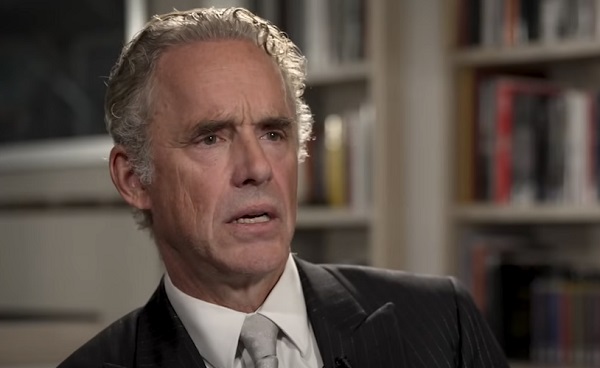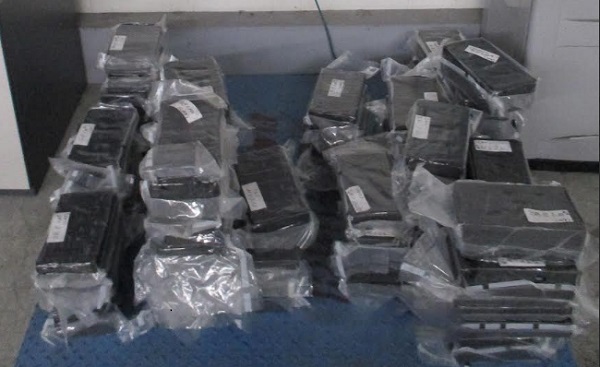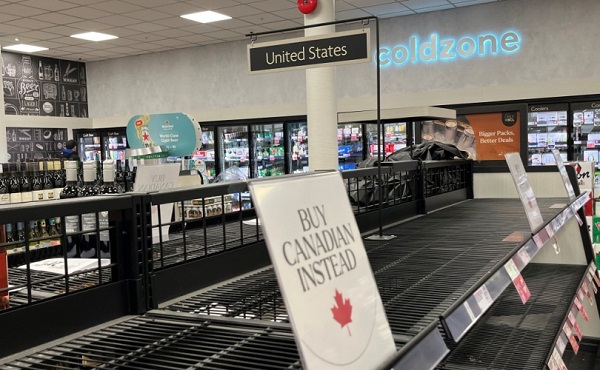Alberta
Game changer: Trans Mountain pipeline expansion complete and starting to flow Canada’s oil to the world

Workers complete the “golden weld” of the Trans Mountain pipeline expansion on April 11, 2024 in the Fraser Valley between Hope and Chilliwack, B.C. The project saw mechanical completion on April 30, 2024. Photo courtesy Trans Mountain Corporation
From the Canadian Energy Centre
By Will Gibson
‘We’re going to be moving into a market where buyers are going to be competing to buy Canadian oil’
It is a game changer for Canada that will have ripple effects around the world.
The Trans Mountain pipeline expansion is now complete. And for the first time, global customers can access large volumes of Canadian oil, with the benefits flowing to Canada’s economy and Indigenous communities.
“We’re going to be moving into a market where buyers are going to be competing to buy Canadian oil,” BMO Capital Markets director Randy Ollenberger said recently, adding this is expected to result in a better price for Canadian oil relative to other global benchmarks.
The long-awaited expansion nearly triples capacity on the Trans Mountain system from Edmonton to the West Coast to approximately 890,000 barrels per day. Customers for the first shipments include refiners in China, California and India, according to media reports.
Shippers include all six members of the Pathways Alliance, a group of companies representing 95 per cent of oil sands production that together plan to reduce emissions from operations by 22 megatonnes by 2030 on the way to net zero by 2050.
The first tanker shipment from Trans Mountain’s expanded Westridge Marine Terminal is expected later in May.
 Photo courtesy Trans Mountain Corporation
Photo courtesy Trans Mountain Corporation
The new capacity on the Trans Mountain system comes as demand for Canadian oil from markets outside the United States is on the rise.
According to the Canada Energy Regulator, exports to destinations beyond the U.S. have averaged a record 267,000 barrels per day so far this year, up from about 130,000 barrels per day in 2020 and 33,000 barrels per day in 2017.
“Oil demand globally continues to go up,” said Phil Skolnick, New York-based oil market analyst with Eight Capital.
“Both India and China are looking to add millions of barrels a day of refining capacity through 2030.”
In India, refining demand will increase mainly for so-called medium and heavy oil like what is produced in Canada, he said.
“That’s where TMX is the opportunity for Canada, because that’s the route to get to India.”
Led by India and China, oil demand in the Asia-Pacific region is projected to increase from 36 million barrels per day in 2022 to 52 million barrels per day in 2050, according to the U.S. Energy Information Administration.
More oil coming from Canada will shake up markets for similar world oil streams including from Russia, Ecuador, and Iraq, according to analysts with Rystad Energy and Argus Media.
Expanded exports are expected to improve pricing for Canadian heavy oil, which “have been depressed for many years” in part due to pipeline shortages, according to TD Economics.
 Photo courtesy Trans Mountain Corporation
Photo courtesy Trans Mountain Corporation
In recent years, the price for oil benchmark Western Canadian Select (WCS) has hovered between $18-$20 lower than West Texas Intermediate (WTI) “to reflect these hurdles,” analyst Marc Ercolao wrote in March.
“That spread should narrow as a result of the Trans Mountain completion,” he wrote.
“Looking forward, WCS prices could conservatively close the spread by $3–4/barrel later this year, which will incentivize production and support industry profitability.”
Canada’s Parliamentary Budget Office has said that an increase of US$5 per barrel for Canadian heavy oil would add $6 billion to Canada’s economy over the course of one year.
The Trans Mountain Expansion will leave a lasting economic legacy, according to an impact assessment conducted by Ernst & Young in March 2023.
In addition to $4.9 billion in contracts with Indigenous businesses during construction, the project leaves behind more than $650 million in benefit agreements and $1.2 billion in skills training with Indigenous communities.
Ernst & Young found that between 2024 and 2043, the expanded Trans Mountain system will pay $3.7 billion in wages, generate $9.2 billion in GDP, and pay $2.8 billion in government taxes.
Alberta
Alberta’s massive oil and gas reserves keep growing – here’s why

From the Canadian Energy Centre
Q&A with Mike Verney, executive vice-president, McDaniel & Associates
New analysis commissioned by the Alberta Energy Regulator has increased the province’s natural gas reserves by 440 per cent, bumping Canada into the global top 10.
Alberta’s oil reserves – already fourth in the world – also increased by seven billion barrels.
The report was conducted by Calgary-based consultancy McDaniel & Associates. Executive vice-president Mike Verney explains what it means.
CEC: What are “reserves” and why do they matter?
Verney: Reserves are commercial quantities of oil and gas to be recovered in the future. They are key indicators of future production potential.
For companies, that’s a way of representing the future value of their operations. And for countries, it’s important to showcase the runway they have in terms of the future of their oil and gas.
Some countries that have exploited a lot of their resource in the past have low reserves remaining. Canada is in a position where we still have a lot of meat on the bone in terms of those remaining quantities.
CEC: How long has it been since Alberta’s oil and gas reserves were comprehensively assessed?
Verney: Our understanding is the last fully comprehensive review was over a decade ago.
CEC: Does improvement in technology and innovation increase reserves?
Verney: Technological advancements and innovation play a crucial role in increasing reserves. New technologies such as advanced drilling techniques (e.g., hydraulic fracturing, horizontal drilling), enhanced seismic imaging and improved extraction methods enable companies to discover and access previously inaccessible reserves.
As these reserves get developed, the evolution of technology helps companies develop them better and better every year.
CEC: Why have Alberta’s natural gas reserves increased?
Verney: Most importantly, hydraulic fracturing has unlocked material volume, and that’s one of the principal reasons why the new gas estimate is so much higher than what it was in the past.
The performance of the wells that are being drilled has also gotten better since the last comprehensive study.
The Montney competes with every American tight oil and gas play, so we’re recognizing the future potential of that with the gas reserves that are being assigned.
In addition, operators continue to expand the footprint of the Alberta Deep Basin.
CEC: Why have Alberta’s oil reserves increased?
Verney: We discovered over two billion barrels of oil reserves associated with multilateral wells, which is a new technology. In a multilateral well, you drill one vertical well to get to the zone and then once you hit the zone you drill multiple legs off of that one vertical spot. It has been a very positive game-changer.
Performance in the oil sands since the last comprehensive update has also gone better than expected. We’ve got 22 thermal oil sands projects that are operating, and in general, expectations in terms of recovery are higher than they were a decade ago.
Oil sands production has grown substantially in the past decade, up 70 per cent, from two million to 3.4 million barrels per day. The growth of several projects has increased confidence in the commercial viability of developing additional lands.
CEC: What are the implications of Alberta’s reserves in terms of the province’s position as a world energy supplier?
Verney: We’re seeing LNG take off in the United States, and we’re seeing lots of demand from data centers. Our estimate is that North America will need at least 30 billion cubic feet per day of more gas supply in the next few years, based on everything that’s been announced. That is a very material number, considering the United States’ total natural gas production is a little over 100 billion cubic feet per day.
In terms of oil, since the shale revolution in 2008 there’s been massive growth from North America, and the rest of the world hasn’t grown oil production. We’re now seeing that the tight plays in the U.S. aren’t infinite and are showing signs of plateauing.
Specifically, when we look at the United States’ largest oil play, the Permian, it has essentially been flat at 5.5 million barrels per day since December 2023. Flat production from the Permian is contrary to the previous decade, where we saw tight oil production grow by half a million barrels per day per year.
Oil demand has gone up by about a million barrels a day per year for the past several decades, and at this point we do expect that to continue, at the very least in the near term.
Given the growing demand for oil and the stagnation in supply growth since the shale revolution, it’s expected that Alberta’s oil sands reserves will become increasingly critical. As global oil demand continues to rise, and with limited growth in production from other sources, oil sands reserves will be relied upon more heavily.
Alberta
Federal emissions plan will cost Albertans dearly

A new report finds every Albertan will have $3,300 less for essentials if the ineffective federal emissions reduction plan is left in place.
For years, the federal government has been targeting net zero by 2050 and putting in place an aggressive approach to reduce emissions as outlined in its Emissions Reduction Plan. This scheme, which included the carbon tax, emissions cap, electricity regulations and other initiatives, has drawn strong criticism from provinces, industry, business groups and Canadians.
A report by the Conference Board of Canada, commissioned by Alberta’s government, sheds new light on the negative impacts of the federal government’s punitive environmental approach. By 2050, Alberta’s GDP will shrink by 11 per cent, employment will decline by four per cent and the average person will have $3,300 less in disposable income – while Canada still misses its emissions target.
Alberta’s government is calling on the next federal government to permanently abandon the carbon tax, emissions cap and the entire flawed federal approach. Instead, the federal government should focus on reducing emissions without hurting the economy or making life harder for Albertan and Canadian families.
“These findings should send a message to whoever ends up being the next federal government. Our province remains firmly committed to protecting the environment and creating a future for our children, but that can’t be achieved by trampling on Canadians’ livelihoods. Ottawa has offered nothing but penalties and vague rhetoric. Instead of meaningful incentives to reduce emissions, we get carbon taxes, a production cap, and layers and layers of costly regulations, all burdening families and workers who are already stretched thin.”
The Conference Board of Canada assessed how Alberta businesses and consumers will react to the federal policies based on the costs and effectiveness of the technologies necessary to meet the federal targets.
It found that Alberta will be disproportionately impacted by the current federal plan, experiencing a deep recession in 2030 and subsequently slower economic growth going forward. According to the report, compared to the 2050 baseline scenario, Alberta’s GDP, jobs, revenue and incomes will significantly decline because of federal emissions policies:
- GDP: Projected to be 11 per cent lower
- Employment: Projected to be 4.1 per cent lower
- Government revenues: Projected to be 9.3 per cent lower
- Real (price adjusted) incomes: Down $3,300 (or 7.3 per cent) per person
Nationally, real GDP in Canada is estimated to fall 3.8 per cent in 2050. Canadian oil and gas production in 2050 would be 37 per cent lower, mostly due to the proposed federal oil and gas production cap.
On March 12, the independent Parliamentary Budget Officer (PBO) – following on reports from S&P Global, Deloitte Canada and the Conference Board of Canada – released a scathing report outlining the negative impacts of the proposed federal oil and gas emissions cap. According to the report, the PBO estimates that the federal government’s cap alone will in fact slash oil and gas production by almost 5 per cent, all while these required production cuts reduce nominal GDP by $20.5 billion in 2032.
The PBO report also suggests this policy will reduce economy-wide employment in Canada by 40,300 jobs and full-time equivalents by 54,400 in 2032.
Alberta’s government continues to call for the next federal government to focus on policies that grow the economy, while working with provinces and respecting the Canadian constitution.
Quick facts:
- The Conference Board of Canada scenarios assume oil and gas production grow to 9.7 million barrels of oil equivalent in 2050 with peak oil production of 9.9 million barrels per day in 2042, reflecting continued global oil demand.
- Canada’s employment is estimated to be 2.6 per cent lower, consumer prices 2.5 per cent higher, and real GDP 3.8 per cent lower in 2050 under the federal plan (compared to the baseline scenario).
- According to the report, Canada’s electricity sector would need to reduce emissions by 376 per cent below baseline in 2050, through significant investment in carbon capture and storage, to meet the federal net-zero commitment.
- The Conference Board of Canada’s realistic scenario assumes carbon capture and storage (CCS) will be deployed at a slower rate than is generally assumed by the federal government.
- Canada’s Emission Reduction Plan, released in March 2022, is a roadmap and its policies include the carbon tax, Clean Electricity Regulation, Clean Fuel Regulation, federal oil and gas emissions cap, methane reduction targets, zero emission vehicle mandates, and various other subsidy programs.
- The Conference Board of Canada’s report on assessing the impact of the federal Emissions Reduction Plan was completed prior to U.S. President Donald Trump’s administration and does not include the impacts of potential U.S. tariffs.
- U.S. tariffs have further illustrated the importance of market access to Canada’s energy security.
Related information
-

 Business2 days ago
Business2 days agoA Look at Canada’s Import Tariffs
-

 Agriculture2 days ago
Agriculture2 days agoIt’s time to end supply management
-

 COVID-192 days ago
COVID-192 days ago10 Shocking Stories the Media Buried This Week
-

 David Clinton2 days ago
David Clinton2 days agoYou’re Actually Voting for THEM? But why?
-

 2025 Federal Election2 days ago
2025 Federal Election2 days agoIt’s on! Federal Election called for April 28
-

 Business2 days ago
Business2 days agoTrump Tariffs are not going away. Canada needs to adapt or face the consequences
-

 International21 hours ago
International21 hours agoPope Francis appears frail as he returns to Vatican following 38-day hospital stay
-

 Alberta16 hours ago
Alberta16 hours agoFederal emissions plan will cost Albertans dearly








